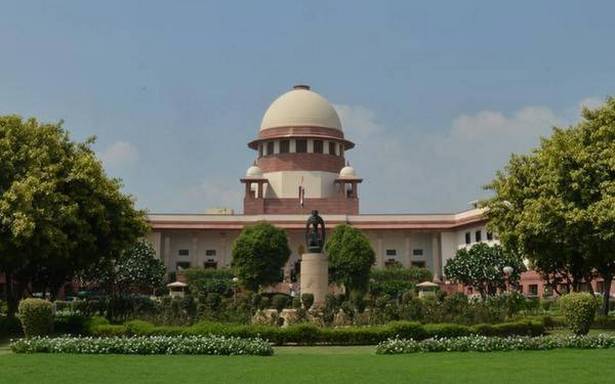Lifts govt. bar on banks declaring accounts as NPAs
The Supreme Court on Tuesday directed banks and financial institutions to refund compound interest, interest on interest or penal interest collected on EMI for loans during the period of moratorium from March 1 to August 31 last year.
“It is directed that there shall not be any charge of interest on interest/compound interest/penal interest for the period during the moratorium,” a Bench of Justices Ashok Bhushan, R. Subhash Reddy and M.R. Shah ordered in a 148-page judgment.
Also read: Loan moratorium | Centre informs Supreme Court it will repay additional interest by November 5
The court said the amount accumulated as compound/penal interest or interest on interest during the six-month moratorium on term loan EMIs should be given as “credit/adjusted in the next instalment of the loan account”.
Justice Shah, who authored the judgment, reasoned that additional interest in the form of compound or penal is usually collected from loan defaulters. When the payment of instalments had already been deferred during the moratorium, what was the need to burden borrowers, already reeling under the financial loss of a pandemic and lockdown, the court asked.
The judgment also spelt relief for banks and lenders with the court lifting its nearly six-month bar on them from declaring accounts of borrowers as non-performing assets (NPAs). In October last year, the apex court had stopped banks and lenders from declaring accounts of borrowers as NPAs.
The judgment concluded that the government’s scheme to restrict the waiver of interest on interest to loans worth only up to ₹2 crore as irrational. This scheme, introduced in October, was limited to debts in MSME, education, housing, consumer durables, credit card, auto, personal and consumption categories within the ₹2 crore limit.
“There is no justification shown to restrict the relief of not charging interest on interest with respect to the loans up to ₹2 crore only, and that too, restricted to the aforesaid (eight) categories. There is no rationale to restrict such relief,” Justice Shah noted.
Also read: Today News 24 Explains | What is a bank moratorium, and when does it come into play?
But the court refused to entertain complaints from petitioners that the government did not do enough to ease the burden of financial strain during the pandemic.
“By and large, everybody has suffered due to lockdown due to COVID-19 pandemic. Even the Government suffered due to non-recovery of GST… Merely, since the reliefs announced by the Union of India/RBI may not suit the desires of the borrowers, the reliefs/policy decisions related to COVID-19 cannot be said to be arbitrary or violative of Article 14 of the Constitution,” the court said.
The apex court further refused the insistent pleas of the borrowers for a total waiver of interest for EMIs falling within the moratorium period. It also declined to extend the moratorium till December 2020 or, as some of the petitioners sought, another six months from August 31, 2020.
The court said a total waiver of interest on loan EMIs would hit the banks and depositors hard.
“To grant such a relief of total waiver of interest during the moratorium period would have a far-reaching financial implication in the economy of the country. Banks and lenders have to pay the interest to the depositors. Their liability to pay the interest on the deposits continued even during the moratorium period… Continuing to pay interest to depositors is not only one of the most essential banking activities but it shall be a huge responsibility owed by the banks to crores and crores of small depositors, pensioners, etc, who survive on the interest from their deposits,” Justice Shah reasoned.
Besides, the court said numerous welfare funds schemes survive on the interest generated from bank deposits.
Also read: Moratorium: SC says no order to risk economy going ‘haywire’
The petitioners, which included members of the real estate and power sectors, had wanted “sector-specific reliefs”.
To this demand, the court replied that “what is best in the national economy and in what manner and to what extent the financial reliefs/packages be formulated, offered and implemented is ultimately to be decided by the government and RBI on the aid and advise of the experts. The same is a matter for decision exclusively within the province of the central government. Such matters do not ordinarily attract the power of judicial review”.
The court further declined pleas to extend the deadline, from December 31, 2020, for the invocation of Reserve Bank of India’s resolution mechanism for “big borrowers” like business and manufacture sectors. The mechanism titled ‘Resolution Framework for COVID-19-related Stress’, issued in an August 6 circular, had informed that lending institutions, guided by their respective Board-approved policy, would prepare viable resolution plans for eligible borrowers under stress on account of COVID-19.


